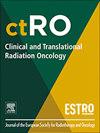Combining CAR-T therapy with radiotherapy or not in refractory/relapsed diffuse large B-cell lymphoma: A comparative study
IF 2.7
3区 医学
Q3 ONCOLOGY
引用次数: 0
Abstract
Background
Radiotherapy and Chimeric Antigen Receptor(CAR)-T therapy may exhibit a synergistic effect, suggesting that incorporating radiotherapy into CAR-T could improve the prognosis for patients with refractory/relapsed diffuse large B-cell lymphoma (R/R DCBCL). A lack of standardized treatment protocols and relevant guidelines in bridging radiotherapy(BRT) prior to CAR-T therapy still exists. Consequently, we retrospectively analyzed the outcomes of R/R DLBCL patients treated with BRT prior to CAR-T therapy or not, aiming to evaluate the efficacy and satety of BRT as well as the impact of radiotherapy dose on prognosis.
Methods
Between December 2017 and January 2025, 80 patients diagnosed with R/R DLBCL were treated with CAR-T. Thirty-five of them received BRT during leukapheresis and lymphodepletion. The primary endpoint of this study was progression free survival(PFS), and secondary endpoints included overall survival(OS), disease-specific survival(DSS), in-field PFS, best objective response rate(ORR), and complete response rate(CRR). PFS and OS of CAR-T were compared between BRT group and no BRT group. In the subgroup of radiotherapy patients, PFS, OS and in-field PFS were compared between the low-Equivalent dose to 2 Gy per fraction(EQD2) subgroup and the high-EQD2 subgroup.
Results
BRT group showed obviously longer PFS and OS than no BRT group(p = 0.001, p = 0.043). In addition, BRT did not increase the incidence of CAR-T toxicities during follow-up (median:35.27 months). Comprehensive BRT subgroup improved prognosis in PFS(p = 0.015) and OS(p = 0.029) when compared with focal BRT subgroup, no significant effect on DSS was noted(p = 0.109). High-EQD2 subgroup did not significantly improve PFS(p = 0.181) and OS(p = 0.665) except for local control(p = 0.079) especially in patients with high tumor burden(p = 0.005). There is no impact on prognosis between early salvage radiotherapy(SRT) and salvage chemotherapy(SCT) cohorts in patients with PR response to CAR-T therapy.
Conclusions
Our analysis demonstrated that BRT is a effective and safe approach for patients with R/R DLBCL preparing for CAR T-cell therapy, which indicated that BRT may enhance the anti-tumor effect of CAR T-cells.
CAR-T联合放疗或不联合放疗治疗难治性/复发弥漫性大b细胞淋巴瘤:一项比较研究
背景放疗和CAR-T治疗可能表现出协同效应,提示将放疗结合CAR-T治疗可改善难治性/复发性弥漫性大b细胞淋巴瘤(R/R DCBCL)患者的预后。在CAR-T治疗之前,桥接放疗(BRT)缺乏标准化的治疗方案和相关指南。因此,我们回顾性分析在CAR-T治疗前或未接受BRT治疗的R/R DLBCL患者的预后,旨在评估BRT的疗效和安全性以及放疗剂量对预后的影响。方法2017年12月至2025年1月,80例诊断为R/R DLBCL的患者接受CAR-T治疗。其中35例在白细胞清除和淋巴细胞清除期间接受了BRT。本研究的主要终点是无进展生存期(PFS),次要终点包括总生存期(OS)、疾病特异性生存期(DSS)、现场PFS、最佳客观缓解率(ORR)和完全缓解率(CRR)。比较BRT组和未BRT组CAR-T的PFS和OS。在放疗患者亚组中,比较低当量剂量至2 Gy / fraction(EQD2)亚组和高当量剂量EQD2亚组的PFS、OS和现场PFS。结果BRT组的PFS和OS明显长于无BRT组(p = 0.001,p = 0.043)。此外,BRT在随访期间没有增加CAR-T毒性的发生率(中位数:35.27个月)。与局部BRT亚组相比,综合BRT亚组改善了PFS(p = 0.015)和OS(p = 0.029)的预后,但对DSS无显著影响(p = 0.109)。除局部对照(p = 0.079)外,高eqd2亚组对PFS(p = 0.181)和OS(p = 0.665)无显著改善,特别是在高肿瘤负荷患者(p = 0.005)。在CAR-T治疗有PR反应的患者中,早期补救性放疗(SRT)和补救性化疗(SCT)队列对预后没有影响。结论sour分析表明,BRT治疗对于准备CAR -t细胞治疗的R/R DLBCL患者是一种有效且安全的方法,这表明BRT可能增强CAR -t细胞的抗肿瘤作用。
本文章由计算机程序翻译,如有差异,请以英文原文为准。
求助全文
约1分钟内获得全文
求助全文
来源期刊

Clinical and Translational Radiation Oncology
Medicine-Radiology, Nuclear Medicine and Imaging
CiteScore
5.30
自引率
3.20%
发文量
114
审稿时长
40 days
 求助内容:
求助内容: 应助结果提醒方式:
应助结果提醒方式:


